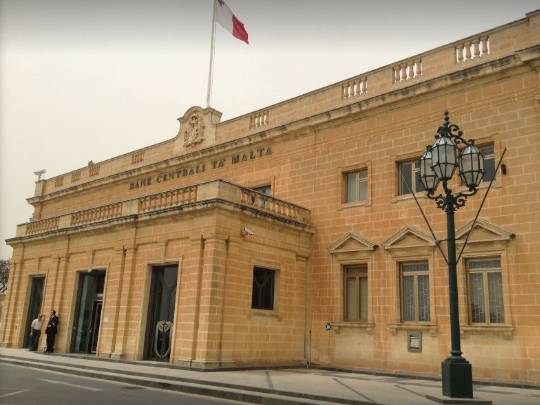Malta’s economy has boomed in recent years, outperforming most other countries in the euro area. Over the past five years, economic growth averaged 7.7 per cent, which Central Bank of Malta Governor, Mario Vella, says is “above Malta’s historical average”. GDP growth in 2019 is still expected to be strong at 5.4 per cent, while forecasts for 2020, predicted to be around the 4 per cent mark, indicate a slight dip.
This drop, however, isn’t a troubling sign, rather a gradual normalisation in the pace of economic activity, says the Governor. “It reflects two factors. On the one hand, our supply of resources is limited and, though we are managing to increase productivity and add more productive resources, there is very little slack. We have the lowest rate of unemployment and the highest rate of employment in our history, and in both cases our rates now are better than in the rest of the euro area.”

On the downside, however, trade tensions have put a brake on world demand, and this is affecting Malta’s trading partners and some local exporters. “That said, we are entering this phase with a glut of private savings and considerable fiscal space. This means that the pace of private consumption need not slow down significantly, even in the face of a slowdown in income growth,” says Dr Vella. “Moreover, the Government has ample financial resources to carry out a countercyclical fiscal policy, particularly by boosting capital investment.”
In this light, the Central Bank forecasts that, while employment growth may decelerate somewhat, the unemployment rate will remain at historical lows and GDP growth will remain above that of Malta’s peers. “We anticipate that the participation rate will continue to improve and that we will continue to require an inflow of foreign workers,” he asserts. “We also believe that our exporting sectors are in a fairly good shape in terms of competitiveness, and that any negative effects from a less supportive external environment could also be partly mitigated by efforts to pursue further economic diversification.”
The strength of Malta’s economy has been bolstered by higher value-added sectors in recent years, among them the financial services, iGaming, property development and, most recently, innovative technology sectors. Dr Vella believes that one of the biggest challenges for these sectors and the firms that operate within them will be the availability of human resources. “This means that the trends that have characterised our economy in recent years, such as the shift to services and to higher value-added activities in productive sectors, are likely to continue.”
The Governor adds that the changing nature of demand means that sectors that are flexible and can offer more customised products will be able to maintain their profitability. “For instance, I think that in our tourism industry the shift away from collective accommodation and towards more personalised accommodation – such as boutique hotels and rented accommodation – will persist, if not accelerate,” he explains.

“Similarly, in an environment of ever scarcer resources, the adoption of technology to improve productivity will become ever more important. Sectors that fail to invest in innovative technological solutions will inevitably lose importance. This, of course, means that if, as a nation, we manage to attract firms that are involved in this technological revolution, we will continue to enhance our position in the global value chain,” Dr Vella asserts. “The coming years will see more technologically advanced investment in Malta rise significantly. I also see large potential for the circular economy and green investment.”
Turning our attention to the Maltese banking sector, the Governor asserts that, similarly to most other European banks, it is “faced with a challenging external environment”, namely a persistent low interest rate environment, a weakening euro area economy, fast technological developments, a more intensive regulatory environment, destabilising trade wars and Brexit uncertainty.
On the positive side, Malta’s robust economic environment has supported financial stability. Dr Vella states that core domestic banks have managed to increase their income from intermediation on the back of increased lending volumes, particularly mortgages, together with a turnaround in corporate lending. Such banks have also tapped into other sources of income, with non-interest income increasing as a share of their gross income.
“Such conditions are also helping the banks to further improve their asset quality,” says Dr Vella. “In fact, supported also by specific regulatory measures, the non-performing loans ratio for the whole banking system stood at 3 per cent in June 2019.”
However, there are down sides, and the Governor cites Malta’s open economy as one of them, which makes it more vulnerable to external shocks. Weakening economic developments in other countries could also affect domestic growth, which could have adverse repercussions on the sector’s performance going forward, the Governor asserts. “The implications of Brexit on the Maltese economy are deemed to be manageable with no serious consequences for the local banks.”
A subject of interest and a challenge for the banking sector is the digitalised environment, specifically the digital economy which is “taking over, almost completely, the traditional way of doing business in banking”. Dr Vella explains that such technological changes have given birth to what is called the ‘open banking’ approach, with technology enabling the unbundling of banking services that are being provided by different players, particularly in the lucrative payments services.
“For banks to remain competitive they need to invest heavily in technology to keep up with the pace of developments, while at the same time meeting customers’ demands,” he says. “Undeniably, this comes at a cost but the advancement in technology provides opportunities for banks to increase their customer base and volumes, with positive outcomes on profitability.”
Turning our focus towards the international stage, the subject of correspondent banking services being withdrawn from Malta by international banks comes to the fore. The Governor says the worldwide de-risking by large correspondent banks, due to increased regulatory pressures and costs of complying with the legal requirements imposed by AntiMoney Laundering (AML) and Combatting the Financing of Terrorism (CFT), is affecting banks in countries with relatively smaller banking sectors.
“Of late, a number of correspondent banks announced the termination of their relationships with small jurisdictions, in a bid to maximise their risk-adjusted returns, cut down on costs and concentrate on more profitable markets. Malta, like other small jurisdictions, has been caught in the crosshairs of this strategy, which is essentially a market failure issue,” Dr Vella says. “The termination of such relationships for certain currencies can have potential far-reaching consequences, including financial exclusion and a deterioration in the integrity of the international payments system and international trade in general.”
The Governor asserts that correspondent banking arrangements are crucial for making cross-border payments, especially in an environment where the US dollar is still the most used currency in trade. Therefore, any disruption in the payments system will affect business and individuals.
“Maltese banks are doing their part to maintain or find alternative clearing arrangements,” he states. “At the same time, the Maltese regulatory authorities have implemented further measures to ensure that banks are de-risking where necessary and are employing enhanced governance practices.”
The silver lining, however, is that local conditions appear favourable overall, according to the Central Bank Governor, and the current strong domestic economic environment should also provide further opportunities for banks. “Buoyant economic activity increases business confidence and, hence, the possibility of exploring new niche markets and investment opportunities are higher. This gives the banks the chance to support new investment and emerging new sectors.”
This interview first appeared in Economic Vision 2020.
Main Image:
